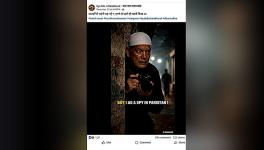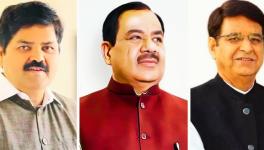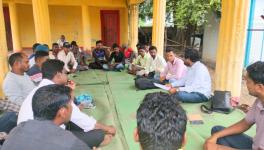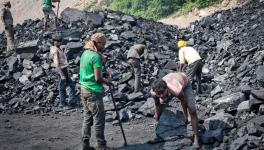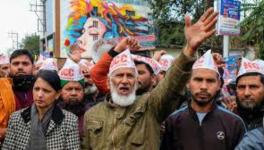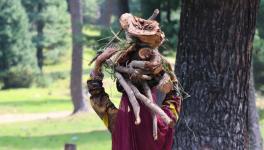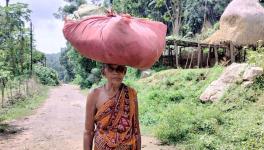Interview: Young Van Gujjars of U’Khand Hope to Build Political Power
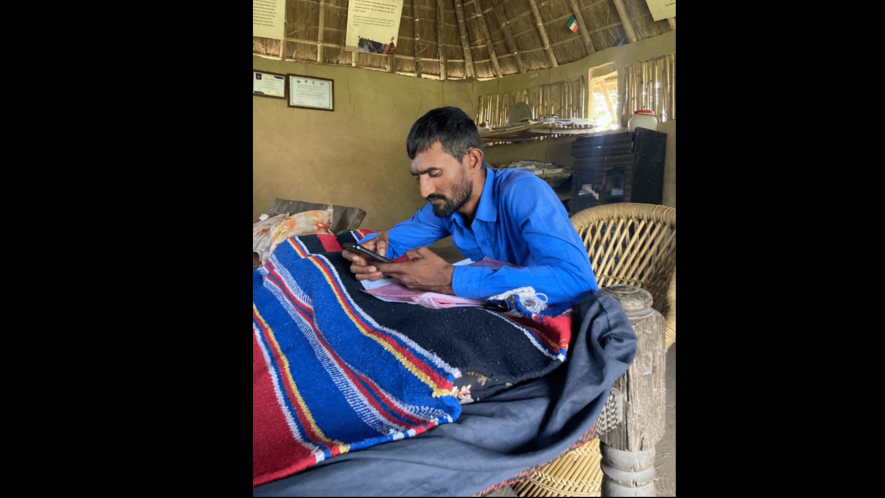
Ameer Hamza at VGTYS Office
The Van Gujjar Tribal Yuva Sangathan (VGTYS) is an organisation in Uttarakhand that has been working for the rights and progress of the Van Gujjar community for the past five years and has brought about relevant social and political change within the community. The members and the leaders educated themselves to represent the interests of their people, a people that have remained relatively cut off from mainstream society.
The Van Gujjar community is a pastoralist tribal community which has lived in the forests for decades. They are primarily dependent on the business of milk obtained through grazing buffaloes throughout the forests of Uttarakhand. They face severe state repression by the forest department, are termed 'encroachers' in areas mandated as national parks, and don't have much defence due to a lack of education and political power.
Ameer Hamza, the president of the Sangathan, speaks of the history of the Sangathan, the internal politics of the community vis-a-vis the panchayat elections happening across the district of Haridwar, and the present dispensation to increase progressive influences of education and modernity within the community. The district and gram panchayat elections in Haridwar were held on September 26. Counting is in progress. Excerpts from the interview:
Interviewer: Tell us about the present state of affairs regarding the elections happening in Haridwar and the role of the Sangathan in them.
Hamza: One leading contender we have been supporting is in the district panchayat board in Gaindikhatta, Haridwar. Another two are contenders for gram pradhan and the block development committee. The other three are contesting for ward member positions in different gram panchayats. So a total of 6 candidates have been contesting from our side who have been part of the Sangathan. A few are contesting in resettlement areas, where new bastis (settlements) of Gujjars are being formed.
Interviewer: When did you start campaigning and supporting these candidates? Was it planned that as soon as the elections came about, you would contest the polls through people working in the Sangathan?
Hamza: Two candidates jumped in at the last moment, one for gram pradhan women's seat, Jaitoon Bibi, and another, Nazakat Ali. Not many preparations had been made to campaign for them, and those are the seats which seem tough to get. The population of Gujjars from the ward that Nazakat is contesting from is only 500, and the rest are other Muslims, SCs, gaderia, garhwali and others. In the case of Nazakat, what we could do was convince some 200 to 300 votes from the SCs and gaderias, and we have been banking on that. You do know how it works in politics.
Interviewer: Interesting. Let's see what happens. Tell us about others.
Hamza: In one place, the women's seat I was talking about, that has been interesting. Gujjars are divided into gotras; there are many gotras. Gujjars vote based on that. Like my gotra is baaniya, and some others are chechi, poswal, and kasana. Here the fight has been between kasanas and lodhas. Jaitoon is in the kasana family (not herself a kasana), and the other candidate against her is Bismillah. She belongs to the lodha family.
In this ward, most families are kasanas, 1,800 families. Lodhas are around 500 to 600. In this gotrabaazi, the lodhas' politics divided the kasanas. If the lodhas win tomorrow, which seems to be the case post-voting, it would be that a few lodhas have left behind and claimed victory against such a large community of kasanas.
A rough estimate of other communities is that after kasanas, baaniyas are the most, then dhindas and khatanas, and after that comes the small population of lodhas. Baaniyas were divided towards kasanas, dhindas also too towards kasanas, and so did the chauhans. What was unexpected and interesting was that the kasanas, around 1,100 families of them, went towards the lodhas. This was done by the lodhas, who divided the kasanas to vote for lodhas, a part and play of how panchayat politics can be moulded.
Even more so, the lodhas have never been into politics due to their low population. Not even a kid from the Lodhas moved towards any other gotras but voted for Bismillah. The game that they have played for the first time is pushing them towards victory. The Sangathan campaigned for Jaitoon, for the kasanas.
Interviewer: This has been interesting; the gotra dynamics affect a lot of the politics of the Gujjars.
Hamza: Indeed. The Sangathan, too, has been affected as well, and even beyond it. Before the Sangathan, we had created Van Gujjar Adhikar Manch to fight for the land rights of the people. The husband of Bismillah, Saifi, who was a lodha, was made the president of the Manch. At that time, I was also asked to be the president. I myself supported Saifi becoming the president. Then I was removed from the Manch itself later on. Then many of the youth of the community created VGTYS.
Interviewer: Why were you removed?
Hamza: This was due to the political affiliations we had. Saifi was a Congress supporter, and then these ideologies were the root of the clashes among us. I was a supporter of the BJP back in the 2014 Lok Sabha elections. I supported present Uttarakhand minister Swami Yatishwaranand. Harish Rawat from Congress, the ex-CM of the state, was also the MP from Haridwar, and I can say that he could win due to the Gujjars. The seat that he contested that gave him the win in the 2009 Lok Sabha elections had 47,000 Gujjars voting for him.
Gujjars supported him during his tenure, and I personally put effort into presenting our community's demand that we get ST status (presently, Van Gujjars have OBC status in Uttarakhand). But to no avail, and hence I started supporting the BJP. Saifi supported Harish Rawat anyway, hence the demise of the Manch. Saifi and I both left politics since the forest department had been disturbing the community. I came about as an individual against the forest department and protested. I went to jail, too, for it. And then, we made the Sangathan that represents the needs and interests of the people.
Interviewer: In some ways, you are traversing towards politics again.
Hamza: This becomes imperative as we face a number of inconveniences and problems due to a lack of representation. For example, in the provisions of the Forest Rights Act, 2006 and District Level Committees, community representatives are mandated. If we can get our people to represent our interests, especially people from the Sangathan, it would help with so many of our problems, not the least of which are forced evictions and the heckling by the forest department.
The local elections are also marred with major evils and problems. Earlier, many outsiders were able to get people from the community for their own parties to contest and win local panchayat elections just by offering money and favours. Since we started preparing for these elections, we have created an image of the community, united them such that now nobody comes from outside, and we make sure people among us represent our community. Candidates didn't clash with each other due to party politics, and we held meetings systematically so that they could contest the elections fairly, minimising outside influences.
Interviewer: What are the issues that you want to raise through the ideology of the Sangathan if you can clear some of the seats that you are contesting on, especially issues of women, for there are reserved seats for them?
Hamza: Women coming out of the community to contest and win elections will overall be of great help to everyone. We are aiming that the women develop a consciousness themselves, that they are united to work on the issues of the community. Sangathan pushes for the agendas of education and libraries and to bring out holistic development of new resettlements of the Gujjars. But in many areas where we are testing these agendas, the people are uneducated and don't know what issues to exercise their voting rights for.
We have future long-term plans for education, to set up libraries, modernise existing schools, prevent open toilets and bring about the construction of cemented toilets. But voters are attracted to the opposing parties who offer promises of pakka makaan, pakki sadak, which are immediate needs and are not long-term goals.
The youth has understood our agenda, but others still remain, something that is a shortcoming of the Sangathan. To make people know that the roads that you have tread for decades have been kacchi, and you may continue to do so for the next five years too. But what we want to do is that your children can get a better education and aim for higher education and learn as such so that they come back to give back to the community.
All mentioned gotras are Muslim gotras.
Kushal Choudhary and Niharika Mehra are independent journalists.
Get the latest reports & analysis with people's perspective on Protests, movements & deep analytical videos, discussions of the current affairs in your Telegram app. Subscribe to NewsClick's Telegram channel & get Real-Time updates on stories, as they get published on our website.











